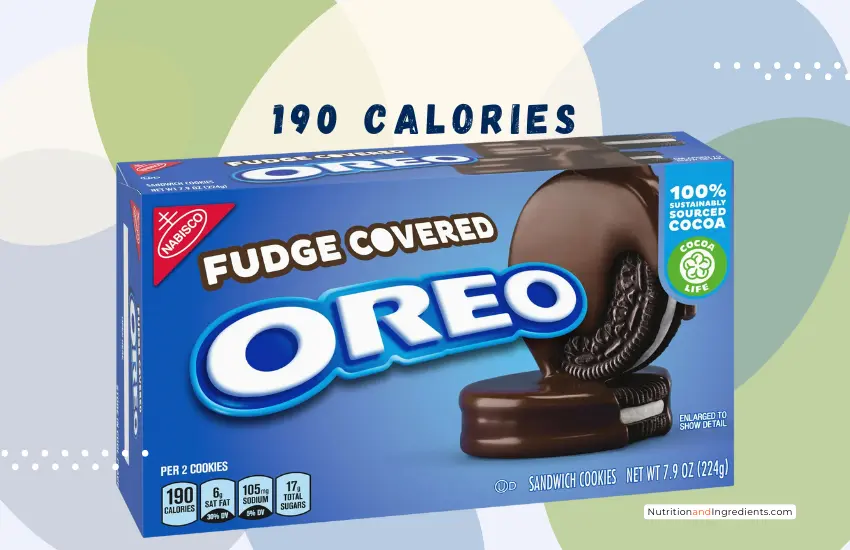Fudge Covered Oreo Cookies

One serving of chocolate fudge covered OREO cookies has 190 calories, 9 grams of fat, 25 grams of carbohydrates, and one gram of protein.
Read this guide for a complete overview of the nutritional information, calories, and ingredients in Fudge Covered OREO sandwich cookies.
Fudge Covered Oreos Nutritional Info
Nutritional information source: OREO
Nutritional information, including calories, are presented based on a single serving. One serving is measured as two cookies with a total net weight of 37 grams.
Serving Size 37g
Calories
190% Daily Value
saturated fat
30%HIGH
sodium
5%LOW
added sugars
34%HIGH
%DV based on 2,000 calorie daily diet
Reference to percentage daily value (% DV) illustrates how much one nutrient per serving contributes to a 2,000 calorie daily diet.
Calories in Fudge Covered OREOs
Two chocolate sandwich cookies covered in fudge chocolate have 190 total calories.
Here is a summary of the amount of calories in one serving derived from fats, carbs, and protein.
Carbohydrates contribute over half of the total calories. Dietary fat makes up 45% of the total calories and the remaining 3% is from protein.
The summary of calories by nutrient is a rounded estimate based on the nutrition facts provided by OREO.
Fat
Two of these sweet chocolate cookies contain 9 grams of total fat, including 6 grams of saturated fat.
With a daily value of 30%, the amount of saturated fat is considered high.
SUMMARY OF DIETARY FAT PER SERVING
Saturated Fat
Dietary Guidelines for Americans (published by the Dept. of Health and Human Services) recommend consuming fewer than 10% of total calories from saturated fat.
The amount of saturated fat in two cookies contain 30% of the recommended limit of saturated fat for an entire day (based on a 2,000 calorie diet).

Sugars
There are 17 grams of total sugars in a serving of fudge covered OREO cookies, all of which are Added Sugars.
The high quantity of added sugars is evident when reviewing the list of ingredients (see below).
Sugar is the first ingredient. That’s notable because food producers publish the list of ingredients in order of dominance by weight.
High Fructose Corn Syrup
OREO fudge covered cookies contain high fructose corn syrup, a form of added sugar.
High fructose corn syrup is a liquid form of sugar that contains both fructose and glucose. Derived from corn, it has 90% fructose and is sweeter than regular table sugar.
According to Healthline, consuming an excessive amount of foods with processed, added fructose may have negative health effects.
An alternative snack recommendation is whole fruits, which contain natural fructose as well as added benefits of dietary fiber and antioxidants.
Nutrition Summary
Serving Size 2 Cookies (37g)
CALORIES
190TOTAL FAT
9g(12%DV)
CARBOHYDRATES
25g(9%DV)
PROTEIN
1g| Saturated Fat | 6g (30%DV) |
| Trans Fat | 0g |
| Cholesterol | 0mg (0%DV) |
| Sodium | 105mg (5%DV) |
| Dietary Fiber | <1g (3%DV) |
| Total Sugars | 17g |
| Added Sugars | 17g (34%DV) |
%DV (Percent Daily Values) are based on a 2,000 calorie diet. Calorie needs vary and your daily value may be higher or lower. Provided for informational purposes only. Consult with your physician for dietary or healthcare advice.
OREO Cookies Nutrition Facts Comparison
The following table provides summary nutrition facts for various types of OREO cookies.
Use the small arrows in the top row to quickly sort by total calories, fat, carbs, protein, or sugars. If you’re viewing the table on a smaller device, click the plus icon to expand the row and display additional information.
| Flavor | Calories | Fat | Carbs | Protein | Sugars |
|---|---|---|---|---|---|
| OREO | 160 | 7g | 25g | 1g | 14g |
| OREO Double Stuf | 140 | 7g | 21g | 1g | 13g |
| Gluten Free OREO | 160 | 7g | 25g | 1g | 14g |
| Golden OREO | 160 | 7g | 25g | 1g | 12g |
| Mint Creme Fudge OREO | 120 | 6g | 16g | <1g | 12g |
| Fudge Covered OREO | 190 | 9g | 25g | 1g | 17g |
| Snickerdoodle OREO | 140 | 7g | 21g | <1g | 12g |
| OREO Thins | 140 | 6g | 21g | 1g | 12g |
Ingredients and Allergens in Fudge Oreos
Ingredients
Here are the ingredients in OREO fudge covered chocolate sandwich cookies.
Ingredients:Sugar, Unbleached Enriched Flour, Palm and Palm Kernel Oil, Soybean and/or Canola Oil, Cocoa (processed with alkali), Nonfat Milk, High Fructose Corn Syrup, Cocoa, Soy Lecithin, Salt, Baking Soda, Chocolate, Natural and Artificial Flavor.
Why is Cocoa Processed with Alkali?
Cocoa alkalization is the process of treating cocoa solids to reduce natural acidity and improve flavor.
Specifically, a food-grade alkali solution raises the pH, which in turn improves the color and enhances the chocolate flavor profile.
Common alkali solutions include potassium carbonate, calcium carbonate, and sodium hydroxide. Depending on which ingredients are used, the resulting color ranges from a light red to a dark charcoal black.
This process is often referred to as Dutched Cocoa.
Allergens
Fudge covered OREO cookies are made with ingredients that contain soy, milk, and wheat.
Nutrition facts, prices, and ingredients are based on available information as of the date of publication. Restaurants and food manufacturers may change recipes or formulations without notice. Check package labels and ask the product manufacturer or restaurant for the most up-to-date information. Unless otherwise stated, %DV is based on a 2,000 calorie diet. All reports and reviews published on this site are for informational purposes only. NutritionandIngredients.com does not provide healthcare advice or dietary recommendations. Always consult your licensed physician for any healthcare or dietary advice.
Nutrition facts and ingredients source: OREO
